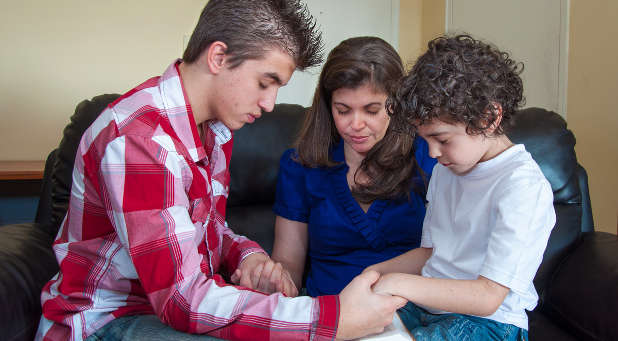“What do we do about our kids?” The group of parents sat together in my office, wiping their eyes.
I was a high school pastor, but for once, they weren’t talking about 16-year-olds drinking and partying. Each had a story to tell about a “good Christian” child, raised in their home and in our church, who had walked away from the faith during the college years. These children had come through our church’s youth program, gone on short-term mission trips and served in several different ministries during their teenage years.
Now, they didn’t want anything to do with it anymore. Somehow, these mothers’ ideas for our church to send college students “care packages” during their freshman year to help them feel connected to the church didn’t strike me as a solution with quite enough depth.
The daunting statistics about churchgoing youth keep rolling in. Panic ensues. What are we doing wrong in our churches? In our youth ministries?
It’s hard to sort through the various reports and find the real story. And there is no one easy solution for bringing all of those “lost” kids back into the church, other than continuing to pray for them and speaking the gospel into their lives. However, we can all look at the 20-somethings in our churches who are engaged and involved in ministry.
What is it that sets apart the kids who stay in the church? Here are just a few observations I have made about such kids, with a few applications for those of us serving in youth ministry.
1. They are converted. The apostle Paul, interestingly enough, doesn’t use phrases like “nominal Christian” or “pretty good kid.” The Bible doesn’t seem to mess around with platitudes like: “Yeah, it’s a shame he did that, but he’s got a good heart.” When we listen to the witness of Scripture, particularly on the topic of conversion, we find that there is very little wiggle room. Listen to these words: “Therefore, if any man is in Christ, he is a new creature. Old things have passed away. Look, all things have become new” (2 Cor. 5:17).
We youth pastors need to get back to understanding salvation as what it really is: a miracle that comes from the glorious power of God through the working of the Holy Spirit.
We need to stop talking about “good kids.” We need to stop being pleased with attendance at youth group and fun retreats. We need to start getting on our knees and praying that the Holy Spirit will do miraculous saving work in the hearts of our students as the Word of God speaks to them. In short, we need to get back to a focus on conversion.
How many of us are preaching to “unconverted evangelicals”? Youth pastors, we need to preach, teach and talk—all the while praying fervently for the miraculous work of regeneration to occur in the hearts and souls of our students by the power of the Holy Spirit! When that happens—when the “old goes” and the “new comes”—it will not be iffy. We will not be dealing with a group of “nominal Christians.” We will be ready to teach, disciple and equip a generation of future church leaders—”new creations”!—who are hungry to know and speak God’s Word. It is converted students who go on to love Jesus and serve the church.
2. They have been equipped, not entertained. Recently, we had “man day” with some of the guys in our youth group. We began with an hour of basketball at the local park, moved to an intense game of 16-inch (“Chicago Style”) softball, and finished the afternoon by gorging ourselves on meaty pizzas and 2-liters of soda. I am not against fun (or gross, depending on your opinion of the afternoon I just described) things in youth ministry. But youth pastors especially need to keep repeating the words of Ephesians 4:11-12 to themselves: “[Christ] gave … the teachers to equip the saints for the work of the ministry, for building up the body of Christ.”
Christ gives us—teachers—to the church, not for entertainment, encouragement, examples or even friendship primarily. He gives us to the church to “equip” the saints to do gospel ministry in order that the church of Christ may be built up.
If I have not equipped the students in my ministry to share the gospel, disciple a younger believer and lead a Bible study, then I have not fulfilled my calling to them, no matter how good my sermons have been. We pray for conversion; that is all we can do, for it is entirely a gracious gift of God.
But after conversion, it is our Christ-given duty to help fan into flame a faith that serves, leads, teaches and grows. If our students leave high school without Bible-reading habits, Bible-study skills, and strong examples of discipleship and prayer, we have lost them. We have entertained, not equipped, them … and it may indeed be time to panic!
Forget your youth programs for a second. Are we sending out from our ministries the kind of students who will show up to college in a different state, join a church and begin doing the work of gospel ministry there without ever being asked? Are we equipping them to that end, or are we merely giving them a good time while they’re with us?
We don’t need youth group junkies; we need to be growing churchmen and churchwomen who are equipped to teach, lead and serve. Put your youth ministry strategies aside as you look at that 16-year-old young man and ask: “How can I spend four years with this kid, helping him become the best church deacon and sixth-grade Sunday school class teacher he can be, 10 years down the road?”
3. Their parents preached the gospel to them. As a youth pastor, I can’t do all this. All this equipping that I’m talking about is utterly beyond my limited capabilities. It is impossible for me to bring conversion, of course, but it is also impossible for me to have an equipping ministry that sends out vibrant churchmen and churchwomen if my ministry is not being reinforced tenfold in the students’ homes. The common thread that binds together almost every ministry-minded 20-something that I know is abundantly clear: a home where the gospel was not peripheral but absolutely central.
The 20-somethings who are serving, leading and driving the ministries at our church were kids whose parents made them go to church. They are kids whose parents punished them and held them accountable when they were rebellious. They are kids whose parents read the Bible around the dinner table every night. And they are kids whose parents were tough but who ultimately operated from a framework of grace that held up the cross of Jesus as the basis for peace with God and forgiveness toward one another.
This is not a formula! Kids from wonderful gospel-centered homes leave the church; people from messed-up family backgrounds find eternal life in Jesus and have beautiful marriages and families. But it’s also not a crapshoot. In general, children who are led in their faith during their growing-up years by parents who love Jesus vibrantly, serve their church actively and saturate their home with the gospel completely, grow up to love Jesus and the church.
The words of Proverbs 22:6 do not constitute a formula that is true 100 percent of the time, but they do provide us with a principle that comes from the gracious plan of God, the God who delights to see His gracious Word passed from generation to generation: “Train up a child in the way he should go; even when he is old he will not depart from it.”
Youth pastors, pray with all your might for true conversion; that is God’s work. Equip the saints for the work of the ministry; that is your work. Parents, preach the gospel and live the gospel for your children; our work depends on you.
Jon Nielson is the college pastor at College Church in Wheaton, Illinois. Jon is currently working toward his Doctor of Ministry degree at Trinity Evangelical Divinity School. He has authored two books: Bible Study: A Student’s Guide (P&R, 2013) and The Story: The Bible’s Grand Narrative of Redemption (P&R, 2014).
For the original article, visit churchleaders.com.
See an error in this article?
To contact us or to submit an article





















